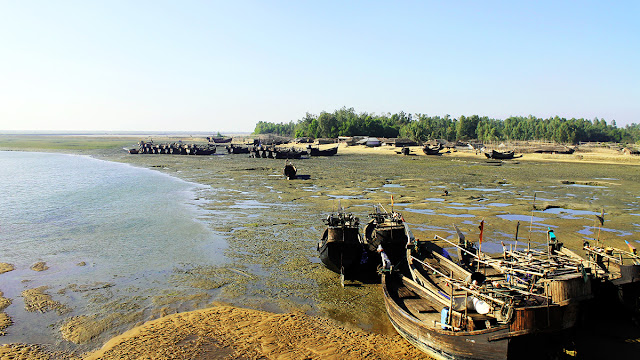Friday, 29 October 2021 | Hasan Mehedi
-------------------------------
 |
| View of Maheshkhali Islands. Photo credit: Tanweer Morshed, Wikipedia |
The Government of Bangladesh (GOB) is to declare the cancellation of 6 more coal-fired power plants which were planned to be developed on the Maheshkhali Islands. The total capacity of these planned power plants is 7920 MW.
The enlisted power plants to be cancelled are:
- Maheshkhali 1320 MW (BPDB-CHDHK) Coal Power Plant (Phase-I)
- Maheshkhali 1320 MW (BPDB-CHDHK) Coal Power Plant (Phase-II)
- Maheshkhali 1320 MW (BPDB-TNB) Coal Power Plant
- Maheshkhali 1320 MW (BPDB-KEPCO) Coal Power Plant
- Maheshkhali 1320 MW (BPDB-SEPCO) Coal Power Plant; and
- Maheshkhali 1320 MW (BR PowerGen) Coal Power Plant
Earlier in June 2021, the Government cancelled 10 approved coal power plants in different zones of Bangladesh. Among those, two power plants with a capacity of 2640 MW were based on the Maheshkhali Islands. The GOB had a plan to develop 10 coal power plants with a capacity of 12960 MW on the island.
Among those, Matarbari 1200 MW Phase-I financed the Japan International Cooperation Agency (JICA) and sponsored by the Coal Power Generation Company Bangladesh Limited (CPGCBL) is under construction now and a feasibility study of Matarbari 1200 MW Phase-II is going on. Two power plants - Maheshkhali Coal Power Plant (Phase-I) and Maheshkhali Phase-II were cancelled in June 2021.
These power plants are going to be cancelled as no progress has been seen on the ground. The GOB is planning to convert these power plants from coal to LNG and renewable energy.
The Bangladesh Power Development Board (BPDB) has already acquired 5518 acres and is in the process of acquiring 96 acres of land on the Maheshkhali Islands to develop coal and LNG-fired power plants of which 3000 MW would be generated from Liquefied Natural Gas (LNG).
Saiful Islam Azad, Secretary of BPDB wrote a letter to the Ministry of Power, Energy and Mineral Resources (MOPEMR) mentioning that two ultra-super critical (USC) power plants with a capacity of 2640 MW were planned to be developed by Bay of Bengal Power Company Limited, which is a Joint Venture Company (JVC) with equal share of BPDB and China Huadian Hong Kong Company Limited (CHDHK).
The BPDB had signed Memorandum of Understandings (MOU) with four foreign companies to build four coal power plants in Maheshkhali with a capacity of 5280 MW.
The Coal Power Plants under JVCs are: Maheshkhali 1320 MW coal power plant under JVC of BPDB and Malaysia based Tenaga Nasional Berhad (TNB), Maheshkhali 1320 MW under JVC of BPDB and Korea Electric Power Corporation (KEPCO) and Maheshkhali 1320 MW coal power plant under JVC of BPDB and SEPCO Electric Power Construction Corporation (SEPCO).
In addition to the JVCs, BR PowerGen Limited (a subsidiary of BPDB and Rural Power Company Limited) proposed to develop a coal power plant on the Maheshkhali Islands with a capacity of 1320 MW. There is no progress observed after signing the MOUs.
Additionally, BPDB agreed in principle to provide 30 acres of land on lease for building a 726 MW LNG based combined cycle power plant on Maheshkhali Island, as per a proposal of Orion Power Dhaka Limited, a subsidiary of Orion Group. It is to mention that Orion Group is the third largest Independent Power Producer (IPP) in Bangladesh.
The power projects cancelled in June are:
- Patuakhali 1320 MW coal power plant of Ashuganj Power Company Limited (APSCL)
- North Bengal 1200 MW coal power plant of APSCL
- Mawa 522 MW coal power plant of Orion Group
- Dhaka 282 MW coal power plant of Orion Group
- Chattogram (Chittagong) 282 MW coal power plant of Orion Group
- Khulna 565 MW coal power plant of Orion Group
- Maheshkhali 1320 MW coal power plant (Phase-I) of BPDB
- Maheshkhali 1320 MW coal power plant (Phase-II) of BPDB
- Bangladesh-Singapore 700 MW coal power plant of CPGCBL and Sembcorp Utilities Private Limited (SUPL) and
- CPGCBL-Sumitomo 1200 MW coal power plant of CPGCBL and Sumitomo Corporation.
A senior official in BPDB said that the cancellation will not cause any problem in electricity supply. Gas, LNG and renewable energy will take the place of the coal power plants. Besides, the Government will focus on increasing locality-based power generation capacity.
